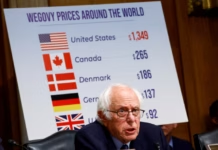A new study, published in JAMA, explores the relationship between policies regulating pharmaceutical sales representatives’ interactions with physicians and prescribing behavior. The results of the study, analyzing data from over 16 million prescriptions, indicate that enacting policies that restrict sales representatives’ contact with physicians is associated with a decrease in prescriptions of the drugs promoted by those sales representatives.
“Implementation of policies at academic medical centers that restricted pharmaceutical detailing between 2006 and 2012 was associated with modest but significant reductions in prescribing of detailed drugs across 6 of 8 major drug classes,” write the authors, led by Ian Larkin, a professor in the Anderson School of Management at the University of California, Los Angeles.

‘Detailing’ is the common practice of pharmaceutical sales representatives visiting physicians. This practice has come under increasing scrutiny, along with concerns about direct to consumer advertising, because of its influence on prescribing practices which may undermine patient care and promote overtreatment. Because of these concerns, many academic medical centers have implemented new policies that put limits on detailing. However, little research has been done examining the impact of these policies and the research that has been done is on a small scale with mixed findings.
Therefore, the researchers’ goal of the present study was to better understand the association between detailing policies and prescribing behavior. The researchers “compared the change in prescribing behavior of intervention group physicians before and after their affiliated academic medical center’s policy went into effect with the change in prescribing behavior of matched control physicians at the same points in time.”
The researchers analyzed 2006-2012 data from physicians at 19 US academic medical centers in all specialties and included 262 drugs from multiple classes. Detailing policies were reviewed based on whether they regulated sales representatives’ gifts to physicians and representatives’ access to medical centers, as well as whether the policy outlined ways to enforce these regulations.
The authors report their findings in terms of market share, calculated by the number of prescriptions a doctor writes for a certain drug divided by that doctor’s total number of prescriptions. The researchers report, “Implementation of academic medical center policies was associated with a mean decrease in market share of detailed drugs of 1.67 percentage points (95% CI, −2.18 to −1.18 percentage points; P < .001) and an increase in the market share of nondetailed drugs by 0.84 percentage points (95%CI, 0.54 to 1.14 percentage points; P < .001).”
Therefore, having detailing policies slightly but significantly reduced the number of prescriptions for drugs that had been detailed by pharmaceutical representatives, and increased the number of prescriptions for drugs that were not detailed, mainly generic drugs.
When each academic medical center was analyzed individually, only 9 of the 19 centers had significant results. An important finding is that for the 11 academic medical centers whose detailing policies included all three criteria examined (regulating gifts, regulating access, enforcement mechanisms), 8 of these sights had a significant reduction in the prescription of detailed drugs. However, for the 8 centers that only enacted one or two of these criteria, only 1 had a significant reduction detailed drugs. These findings suggest that detailing policies should include all three criteria in order to have a significant impact on prescriber behavior.
The authors identify limitations of the study, including that the data was not validated for accuracy. Also because of the research design, one cannot conclude that implementing detailing policies directly causes changes in prescribing practices. The authors note that they did not have access to information about other changes academic medical centers may have made at the time of policy implementation (e.g., trainings about industry influence) which may also impact prescriber behavior.
This study is the first to conduct a large scale investigation into the relationship between changes in academic medical center detailing policies and prescribing practices. The authors note, “The reduction in the prescribing of detailed drugs and the increase in the prescribing of nondetailed drugs potentially represents a large reduction in costs” as generic drugs are generally 80-85% less expensive than brand-name drugs. Therefore, enacting detailing policies that regulate sales representative gift giving, access, and include enforcement mechanisms, could have a significant economic impact by decreasing the brand-name drugs that are prescribed.
****
Larkin, I., Ang, D., Steinhart, J., Chao, M., Patterson, M., Sah, S., … Loewenstein, G. (2017). Association between academic medical center pharmaceutical detailing policies and physician prescribing. JAMA, 317, 1785-1795. doi:10.1001/jama.2017.4039 (Abstract)














